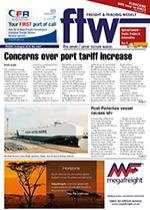Concerns over the Trump administration’s ongoing feud with the Chinese and his insistence on ending free trade agreements are increasing in the United States.
According to Jonathan Gold, vice president of supply chain and customs policy with the US National Retail Federation (NRF), the persisting trade issues are worrying.
“There are concerns from the business community about the ongoing free trade agreements and trade enforcement issues,” he said. This started soon after Trump came into office, with one of his first actions on trade being the withdrawal from the Trans-Pacific Partnership (TPP) last year.
“The business community was disappointed about this. TPP was a good deal that took the US further than we had been in other free trade agreements and kept us in the Asia region as far as being a leader on trade issues,” he said.
Gold said this concern extended to the North American Free Trade Agreement (NAfta) that was currently under discussion. He said Nafta certainly needed to be updated but there was no reason to withdraw from it altogether, yet there were ongoing threats of withdrawal from Trump.
“There are a couple of provisions that the US is pushing that are poison pills. First and foremost, a five-year sunset,” he said. “It makes no sense to have a free trade agreement that will end in five years. If there are opportunities to update and amend a free trade agreement, then do that, but not under threat of termination. No-one is going to invest knowing there is a potential of it ending in five years.”
Gold said business was also concerned about the aggressive rules of origin that were being pushed, rules that would not work in today’s global value chain.
“There is much concern over the rules of origin that are under discussion for the auto industry in the North American market. Also, the textile and apparel side are worried about the rules of origin being pushed for them.” Gold said just as worrying were current duty impositions and the escalating trade war with China.
“Countries are retaliating against the tariffs being introduced by the US and they are starting to take effect,” he said. “The issue around steel and aluminium, for example, is going to result in an increase in prices across the supply chain. The retailers might not import steel and aluminium, but they use it extensively in stores and distribution centres. The products they sell, like canned goods and washing machines, are packaged using steel and aluminium. We are seeing real price increases in all of this. It’s very concerning.”

